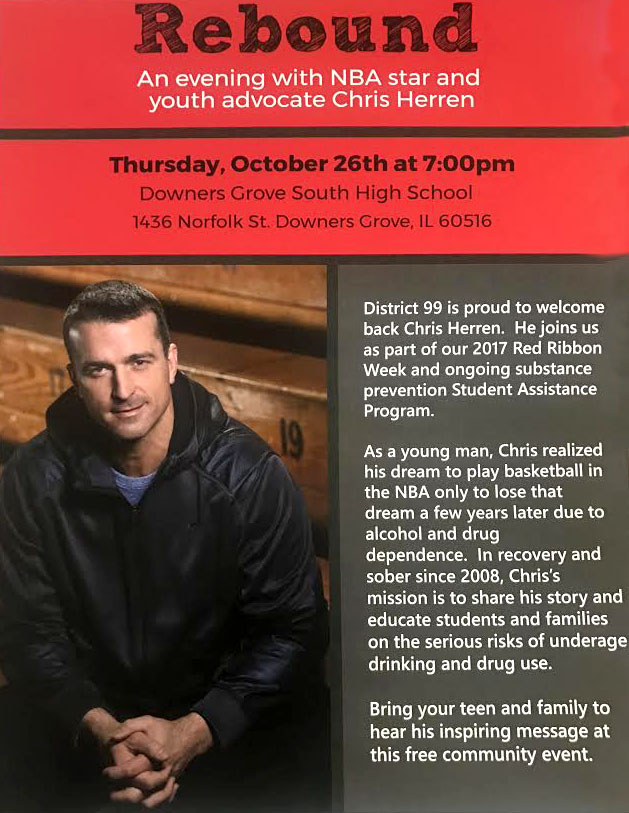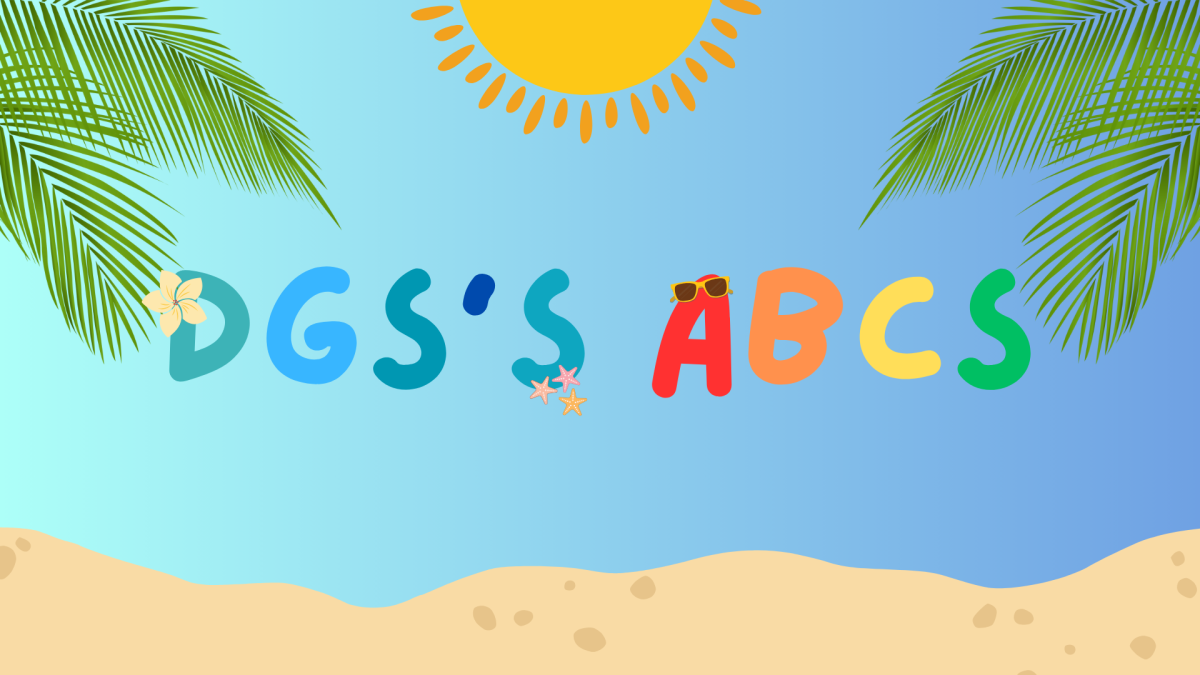Former NBA player Chris Herren talks on his battle with substance abuse
October 4, 2017
ESPN’s 30 for 30 documentary “Unguarded” on basketball player Chris Herren brought immediate publicity to the 42 year-old’s intense battle with drugs and alcohol as a young man. In 2013, Herren came to DGS as the Red Ribbon Week guest speaker, leaving students and teachers feeling immediately inspired. Now, four years later, Herren is returning to DGS to speak to this entirely new audience of students.
How long have you been doing public speaking? What inspired you to begin?
I’ve been doing it for seven years. Doing it now at the pace that I do it I do roughly 250 a year. At times obviously, it’s monotonous. From the outside looking in people often say to me like, “don’t you ever get tired of doing this over and over?” and I say the audience is never the same. The kids in front of me change everyday so whether I’m in front of a professional sports team or a high school or a middle school, people are impacted by it. That’s what keeps me going, and that’s what keeps me inspired to continue doing it.
Do you ever feel nervous talking about such a personal topic to such large groups of people?
Of course, and I often say if I don’t get nervous or if I feel comfortable before addressing two or three thousand high school kids, then I shouldn’t do it anymore because I know then it doesn’t mean as much to me as it used to. So honestly as often as I do it, I’m still very very aware of my audience but yes, aware that I still have butterflies, and I’m nervous before I present.
How do you get through those nerves and continue to present your content?
You have no choice. Once the microphone is handed to you, you don’t have a choice, so you know you try to be as transparent and honest and open and aware of the people that you are presenting in front of and what message you want to deliver to them. There’s a lot of preparation that goes into this, and you know coming back there four years later, that special to me. It’s special that the school, the community, believes in me that I have a message that will resonate with the students.
I found that you have started organizations such as “The Herren Project” and “Hoop Dreams with Chris Herren,” what are your goals and aspirations through these organizations?
So The Herren Project I started six years ago, and that’s built in to assist families and people who are struggling with drugs or alcohol. To help navigate the treatment process for them, a lot of families kind of wake up one day and realize you know we are in a really dire situation with our son or daughter, and it’s really hard to make good sound decisions when you have a broken heart or you’re in full blown panic mode, so we have a team of people that help families with that process. We pay for sober living and we also you know when I started public speaking I got a tremendous amount of emails from students and I felt that it was my responsibility as a speaker if I’m going to walk into a school and try to empower kids from within and talk about their struggles, it’s my responsibility to have people on the back end that can help them. So you know we have a whole team in place: social workers, sober coaches and recovery coaches that field the emails from students as well.
Looking back now what do you think got you into substance abuse?
My presentation will be different, I think some teachers will see me four years later and say that was a different presentation than we witnessed four years ago. I think when it comes to addiction I think we focus on the worst day, and we forget the first day. We want to show our children the drug addicts and say look how bad instead of sitting there and thinking about why did it begin. So I grew up in a house, my dad was a politician in Massachusetts and when my dad suffered from alcoholism, and I knew my father’s drinking was causing pain in my family. I knew my parents would get divorced eventually because of it and I knew my mom had a broken heart. But I started drinking. I started drinking my father’s beer when I was a freshman in high school. That was the beginning for me, and I will always find it sad when I see a young kid who suffered in real life because a parent, a sibling that they’re struggling with a loved one and their starting that process as well. We all have a beginning, we all have day one and you know my dad’s Miller Lites was my beginning.
At the time you were abusing did you know it was wrong? What went through your head?
So I’ll say this to your student body that there was never a night that I walked in my house after drinking or smoking pot in high school, there was never one night that I went into my bedroom and snuck past my parents because I didn’t want them to catch me that I looked in the mirror and I said, “Ah, I’m so proud of you.” I was not proud of myself getting drunk at 16 years old. I might have pretended I was when I was by my friends but when I was by myself at home, I was not proud of it. And I was always in awe of the kids who didn’t have to. I was always in awe, I was, I couldn’t understand how they could have the same amount of fun, do the same exact things that we did, without it. I think that’s something that’s missing. I think that’s missing that those kids who don’t have to do it, they deserve a lot of credit.
Do you think that the pressure of being a pro basketball player had any influence on your substance abuse?
I think that played a part in it but you know that started at a very young age. I think my family history, the conditions behind closed doors. From the outside looking in, we looked like a pretty successful family but from the inside looking out we had some pretty sad days. So that was the beginning, and then I became a basketball player that was given quite a bit of talent, and I didn’t really have the coping mechanisms to handle the pressure that came along with it. I kind of figured out at a young age that I could go down in the basement of my best friends house and get drunk and not think about anything but at 16 years old that not the solution, so that became my solution you know at a young age and that continued for many years.
What would you tell your past self who was going through substance abuse?
Oh goodness, well I had to write a note to self for a segment on Good Morning America I think, or whatever show Gayle King is on. They asked me to write a note to self a 500 word note to my past self, and I thought it was when I spoke to them I thought it was going to be so easy and it was the hardest assignment I’ve ever done. I would try to talk to that young boy and encourage him to have a voice. You know, to talk about the pressure, talk about the pain, talk about the family, to find the solution, to not worry about what others thought of me, to stand up for I believe in and ask for what I needed.
Was there a turning point you can identify that made you realize you needed to focus on sobriety?
Oh goodness, when you live in the world I lived in, when I started doing cocaine at 18 when I started taking pills. There’s a chance your going to die, there’s no other way to put it. I mean there’s a possibility of death and there’s nothing social about that, you crossed the line. And anytime you go out on a Friday night and are willing to take a chance at dying and you want to tell yourself to have fun you know, you know deep down inside, you lost. I knew at a pretty young age that I was, I was on the wrong path. My social life did not align with my goals and the work that I was doing towards that. So they were opposite unfortunately.
What factors motivated you most during your recovery period?
So obviously I have a beautiful family but at the end of the day I had to find that, I had to find it within me that I was worth a better life. That I had it in me to be the father that I wanted to be, a parent that their kids could look up to and you know during the assembly with the students when I come back and I think I don’t know it’s up to you whether or not to put this in but you know, think about your little brother or sister on a Friday night and is this something that you want them to be doing. You know do you want your little sister or your little brother trying what you tried and engaging in certain things that you’re engaged in and a lot of kids when I say those things literally will shake their head when I say it, and I just ask them if it’s not good enough for your little brother–who you love–why has it become good enough for you? I think we often lose sight of that. But even though we’re not proud of it, even though we don’t want our little brother or sister to do what we’re doing, we still do it you know and that needs to be looked at because you can sit there and say that you don’t want them engaged in it, but you are and high school kids need to look at that stage that their in. The reality is, in my opinion, I think wellness is something that’s under-served. I think we don’t talk enough about it, it’s more about academics and athletics nowadays than it is about the overall wellness of a student. I think that the better kids feel about themselves, the better off they are in anything. Surrounding yourself with people who appreciate that, are influences in that, that are making the right decision and staying away from substances, you know the people who you surround yourself with are critical. And I often say when I was in high school, I never hung out with the people who were making the right decisions. I didn’t want to be them, I wanted to spend time on Friday nights with people who made the exact decisions I made. So that’s a huge piece in it, and unfortunately, undervaluing we just don’t appreciate it. So you know that wellness aspect. You know the talk I do this time it will be a lot different, because four years ago I probably went there and I told my story and the response would always be from students was we really appreciate your story, your vulnerability, your honesty, your transparency, but they would never talk about themselves you know. The goal is to get students to reach out and talk about what they’re going through and what they want to be better at, and the emails that we receive since I changed the format is probably ten times more than prior to. So you know someone in recovery I’ve learned over years that lets reflect back and talk about how it all began rather than how bad it was in the end. I was an All American, I was ranked in the top 20 basketball players in the country, I was recruited by every school in America, I had a pretty cool story in high school but that didn’t allow me to go out on a Friday night and feel good enough about myself and not self destruct. If I had that wellness component where people were around me were trying to influence me to do the right thing and I had that built in, things might be different today. I really look forward to coming back.
What advice would you give to people struggling with substance abuse now?
To immediately reach out and talk to somebody about that struggle. It’s the only way in my opinion to get out of it is to communicate to someone who you trust who you respect who is well versed and educated to help you find a way out of it. Nine years sober I still need people in my life who are going to tell me I’m going in the wrong direction. So my recovery network is a huge reason why I’m nine years sober and learning how to communicate and talk about my struggle and what I’m struggling with, the people who understand that have been an integral part in my recovery. To anyone struggling I would encourage them to tell somebody to put the faith in someone that their gonna help you out of it.
What kind of message do you hope to get across to DGS students during your talk with them?
I want kids walking out of the gym questioning whether or not they are who they want to be. If they’re comfortable with the kid that their becoming. I want kids to go back to class and sit in class and think: am I the big brother that I pretend to be. And to ask themselves, what is it about themselves that on a Friday night they have to change who they are. Why don’t they feel comfortable hanging out with kids they’ve known since they were five without drugs or alcohol involved in it. I mean can you imagine? If you can’t hangout with kids you’ve known since you were five years old without getting drunk to have fun that needs to be looked at.
Herren will will travel to Downers Grove on Oct. 26, the day he will speak to the students of DGN. That night Herren will additionally host a community presentation at DGS. Herren will complete his trip to Downers Grove by speaking to the DGS students on Oct. 27.




